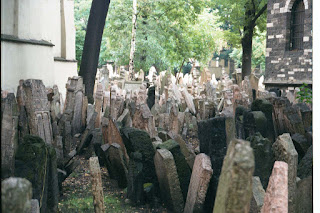What is causing me to ponder death again? Ageing in my own body brings this to bear often, as does the reality of the calendar. Then this week three more Jewish men, two from my home town, and one of those from my class in school, all passed away. It's never easy to read obituaries and wonder-- is that it? After all those years, all those hours at work, all those photos, all those journal entries, family holidays, and late-night walks with a crying baby... what are they all about? Most obituaries are marked by a list of family members and some mention of occupations. Is that all that sums up our life?
Twain's comment about being prepared to die based on living fully tells me that I can't be looking backward at my accomplishments nor at the worries of life in the future, but take care of things today, and live in right relationships for sure. We only know death is coming, like Butler said, but never really evaluate our own death after it happens.
Here are some other XIX folks and their considerations. Mary Ann Evans, whom we know as her pen name George Eliot, said, "Our dead are never dead to us, until we have forgotten them." Many in the Jewish world understand that, and the anniversary (' yahrzeit' ) of the deceased brings special mention in synagogue, on plaques alit again, and even memorial candles. It's right even as I thought of and prayed in thanksgiving for the memory of some family members even this week as well. But memory-- is that all there is? "The boundaries which divide Life from Death are at best shadowy and vague. Who shall say where the one ends, and where the other begins?" so said Edgar Allan Poe. Ah, the 19th century...so full of characters like Poe and his dark side, long before Hogwarts or Darth Vader. But what Poe is onto there isn't bad. Yes, there is a terminus and we will all reach that moment when life ends, the monitor shows a flat line, the final breath departs from our quivering lips, and we pass into eternity. But the vague nature of the passing, and certainly we have no personal experience of the final chapter ourselves... all does seem a bit shadowy and vague. What will the ending look like? What will it be like on the other side?
I believe that life from the dead is not only possible; it's guaranteed by the Author of Life. God began life even before the Garden of Eden, as recorded for us in the Bible, the Tenach, the Holy Scriptures. He made light to shine out of darkness and breathed (I believe the word 'yipach' literally means to blow (as into an instrument) and that's the word used for God breathing) the breath of life into Adam there. How awesome! How personal! How sure then for us, millennia later to be able to experience His personal touch and care.
It may seem a bit shadowy and vague, but in history, when Yeshua, God's only Son, was killed by the Romans, on the 3rd day He was raised again to life by the same Spirit that dwells in us. Oh death, where is your sting? (Hosea 13.14)
What do you think?






No comments:
Post a Comment